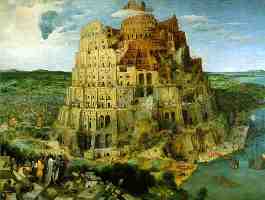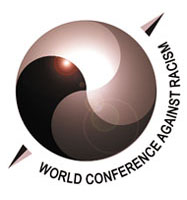| |

Copyright © 2003 The International Herald Tribune | www.iht.com
| Choosing a flag to unite a planet |
Tad Daley IHT
Wednesday, January 28, 2004 |
|
Earth to Mars
LOS ANGELES, California President George W. Bush took a shot at establishing a legacy beyond a permanent war on terror when he delivered his space vision speech at the headquarters of the National Aeronautics and Space Administration earlier this month. Arrayed behind him were several pieces of NASA artwork depicting future moments in space exploration.
The one most directly behind his back showed a futuristic landing craft, a rocky red surface, a blue-gray sky and an astronaut holding a pole with an American flag.
Although such a landing is probably at least a quarter-century away, according to the Bush administration's own timetable, apparently it has already been decided to plant in the soil of Planet Mars not a flag representing all the inhabitants of Planet Earth, but a flag of the United States.
Perhaps the most obvious level on which this might turn out to be an unwise artistic choice is financial. President Bush advocated going back to the moon, establishing a permanent presence there, and only then venturing onward to Mars. The only possible way to pay for all that will be to allow this new space initiative to unfold as a global collaboration rather than an international competition.
It's difficult to see what motive either a citizen or a government of another country might have to invest their toil and treasure in such an undertaking after seeing that piece of art.
Why participate, if the decision has already been made that the very first astronaut will be representing only some rather than all of us?
There's also an issue larger than simply sharing the expenses. If there's anything that should be done on behalf of all the Earth, it is the first time a single human sets foot on a planet other than Earth. A 21st-century space program could generate a profound sense of human solidarity, a non-negotiable ethic of shared destiny, an intuition that we are all in the same boat on Spaceship Earth. It could cultivate what the great developmental psychologist Erik Erikson called an "all-human solidarity," and what Voltaire called a "party of humanity."
The irony to the president's backdrop is that almost every astronaut seems to perceive such larger horizons. "The first day or so we all pointed to our countries," said the Saudi Arabian astronaut Sultan Bin Salman al-Saud, himself from a region as polarized as any in the world.
"The third or fourth day we were pointing to our continents. By the fifth day we were aware of only one Earth." Another international astronaut, Kalpana Chawla, born in India but raised to the heavens as an American, looked down from Columbia's last voyage, but then decided to look up. "When you look out at the stars and galaxies," she said, "you feel like you come not from any particular place, but from the solar system."
Even Neil Armstrong experienced a transnational epiphany. Interviewed in 1979 for Apollo 11's 10th anniversary, he was asked how he felt as he saluted the American flag. "We didn't have a strong nationalistic feeling at that time," he said. "We felt more that it was a venture of all mankind."
The 27 fortunate souls who have ventured outward to lunar orbit have all gazed upon a single, borderless, breathtaking planet suspended among the blazing stars. They were perhaps the first humans to have the opportunity to grasp that the whole Earth was more than the sum of its parts, that it was something singularly deserving of our loyalty, our allegiance, our planetary patriotism.
So let us envision a slightly different scene than the one arrayed behind the president. The first passenger-bearing spacecraft has just set down on the Martian plain, near a gully in the long shadow of Olympus Mons. Five billion human souls sit spellbound, glued to television screens, the single greatest moment of shared human experience. The door opens, and the chosen one emerges into the Martian sunlight. Perhaps he or she is today a sophomore at a high school in Kansas, or Mississippi, or Ethiopia. He or she takes three cautious steps down the ladder, and then plants a boot squarely onto the surface of Planet Mars. And the visitor declares, "We come in peace, we come to explore, and we come to endure. And so today, here in the soil of Planet Mars, I plant the flag of Planet Earth."
It would be a precious gesture, one that would make all Earthlings feel part of the venture. If an artist's rendition of that moment had been displayed behind the president, it might have done more to bring our world together, in a stroke, than all the things Bush has done in three short years to drive it apart.
The writer serves as senior policy advisor to the presidential campaign of Representative Dennis Kucinich.
 Copyright © 2003 The International Herald Tribune Copyright © 2003 The International Herald Tribune
|
|

 Copyright © 2003 The International Herald Tribune
Copyright © 2003 The International Herald Tribune







 UN World Conference Against Racism
UN World Conference Against Racism 


